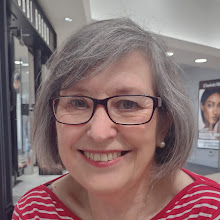Kipling lived from 1865 to 1936 - and was already a world famous writer before Victoria died. In 1907, he became the youngest ever Nobel Laureate for Literature - and holds that record to this day. But in 1915 everything changed for him, when his son John [known in the family as Jack] died in WW1 aged just 18. Rudyard never recovered from this loss, and his writing, and attitudes changed. Sadly his son's body was not recovered - Kipling went to his own grave not knowing the whereabouts of his son's remains. But despite his own personal grief, he threw himself into the work of the War Graves Commission. He insisted that all headstones should be identical in size, whatever the rank of the soldier interred beneath. He was the one who suggested the Biblical text "Their name liveth for evermore" be inscribed, and also that on the gravestones of those unidentified, it should say "Known unto God"
In 1990 the WGC changed the inscription on the headstone of one such grave in St Mary's ADS Cemetery, Loos, France - as they believed it genuinely contained the body of Jack Kipling. It became a place of pilgrimage for many Kipling readers, despite a book being published which claimed to show the WGC had got it wrong. For 25 years, there has been controversy over this decision. The WGC has always refused an exhumation - it is not their policy to disturb the remains of the fallen except in very exceptional cases.
But news has come this week of fresh evidence. The BBC magazine contains an article about this, and two researchers now feel this definitely is Jack's grave.
Kipling died never knowing where his son was laid to rest- he wrote a poem in memory of his son.
In 1997, David Haig wrote a play entitled "My Boy Jack" about Rudyard and his son. It was filmed for the BBC, with Daniel Radcliffe as Jack, and Haig himself playing his father. Here is a clip from the film where he recites his verses
These days we talk a lot about 'closure' - being able to accept things, and to move on. I don't believe Rudyard ever truly found that. But I think that his work for the WGC, and especially for the Tomb of The Unknown Warrior must have been a real help to so many other bereaved families. The Tomb in Westminster Abbey was the first such in the world [both the Queen Mother, and Katherine, Duchess of Cambridge, laid their wedding bouquets there]
In 1993, Paul Keating, PM of Australia, suggested the wording on their nation's Tomb should be altered to read He is one of them, and he is all of us. Public outcry demanded it remain unchanged. I think the people were right. We may not be sure of the identity of the person who died for their country and is buried in that grave, but we can be sure that they are Known Unto God




What a wonderful way to turn something tragic into something that helped so many others.
ReplyDeleteI hope he was proud of his achievements for fellow bereaved parents.
X
Oh p.s - can you pop me your address in an email. I have a magazine to send you x
ReplyDeleteYou made me cry! What a beautiful poema and so sad. I am so glad there was outcry, all who are lost are known unto God, every one of them.x
ReplyDeleteYou always write such interesting posts, Ang - there's very rarely one that doesn't interest me in some way - where DO you get your ideas from?! This one is particularly interesting and moving. Thank you.
ReplyDeleteThanks FD - I picked up a snippet of news on the BBC website about Kipling's son, and was so intrigued I had to find out more. It seemed interesting and worth sharing - glad you enjoyed it x
Delete